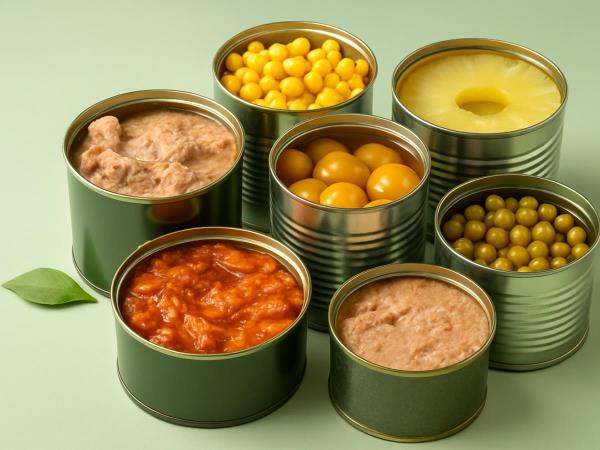Canned food is quick, cheap, and easily accessible, and you can find it in salads, sandwiches, pasta, risottos, and soups. Many people, when in a hurry, even replace a fresh meal with it…
Unfortunately, behind the convenience, there are often substances that do not do your body any favors. These are substances that the body recognizes as intruders, even though their taste often gives a pleasant, homely feeling.
What’s in cans that the body doesn't need?
The most common problem is too much sodium. Sodium is a mineral that the body does need, but only in small quantities. The World Health Organization (WHO) recommends about 2000 mg of sodium per day, which equals one teaspoon of salt. But a single portion of canned soup or p{-15454}t{-15447} can contain from 700 to 1200 mg of sodium, which means you can exceed the daily limit before the day even really starts.
The second issue is preservatives, which ensure food lasts longer but can trigger reactions in sensitive people: bloating, headaches, skin rashes, irritated intestines…
Frequently, canned products contain substances marked with codes such as:
- E250 - sodium nitrite
An additive that preserves the color of meat products, but often supports inflammatory processes. - E211 - sodium benzoate
A preservative linked to allergic reactions in sensitive individuals. - E621 - monosodium glutamate (MSG)
A flavor enhancer that can cause headaches and flushing in some people.
If these substances appear in your diet for years, even if only occasionally, they can affect how you feel in ways people often don't connect to food.
What does science say about the effects of canned food?
Research in recent years confirms that regular consumption of canned food is associated with more health risks.
- A 2022 study (published in the Journal of Hypertension) found that people who frequently eat foods with higher sodium content increase their risk of high blood pressure by 23%.
- A 2021 study found that nitrites (E250), present in canned meat products, can alter gut microbiota, weakening the body's natural defense. Gut flora (which simply means the community of beneficial bacteria in our gut) is crucial for good well-being. There are more bacteria living there than stars in our galaxy. If this community weakens, digestive, skin, and general vitality problems appear more quickly.
How canned food affects the body
The body always reacts to what you eat. If something is too salty, too fatty, or full of chemical additives, it shows you in its own way. Symptoms that many ignore are often very clear messages:
- bloating after a meal
- dry or irritated skin
- a feeling that your heart is beating faster than it should
- slow digestion or heartburn
- trouble sleeping.
If something is quick and easy, it’s worth asking: can the body accept it as fuel and not see it as an attack?
What you can do – homemade, cheap and doable
The solution is not to never eat canned food again. The solution is to choose smarter, because every bite has consequences. Instead of classic p{-15454}t{-15447}, you can make a tuna and avocado spread at home. Avocado contains vitamins E, C, B6, more than 20 different minerals, and fibers that help digestion. Even canned tuna is an acceptable compromise if you choose one without additives and with little salt.
Instead of ready-made soups, you can cook a larger amount of homemade vegetable soup once a week and freeze it in smaller containers. This way you get a quick solution without unnecessary additives.
If you want to protect your heart, skin, and digestion, pay attention to the following key words when buying food: no nitrites, low sodium, no preservatives, no MSG, natural ingredients, fermented food, homemade.
These terms will give your shopping a new direction and your body a reason for gratitude.
The body remembers every can
Although canned food seems innocent and convenient, it’s good to know that over time it can become a silent companion to problems that don't appear overnight. Inflammation, fatigue, skin issues, and heart rhythm problems often start where you least expect: in small packages you open every day.
And although canned food will never completely disappear from our kitchens, remember: let cans be a rare guest and not your master.









 Would you like to be informed about news on the website?
Would you like to be informed about news on the website?

